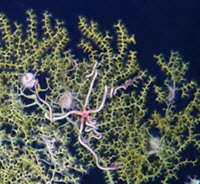Category Archives: Fact Sheets
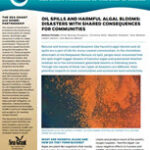
The Sea Grant Oil Spill Outreach Team released a publication that discusses the concerns that people had about harmful algae blooms (HABS) being triggered by residual oil from the Deepwater Horizon incident. HABs have occurred after oil spills in the past, but the relationship between the two is not always clear. Read Oil Spills and Read More

The Alabama Center for Ecological Resilience (ACER) blog hosted a series of posts discussing the meaning behind various terms and concepts that are important to ACER research. Diversity and Resilience Ecosystem Services Disturbance and Perturbation Bacteria and Prokaryotes Denitrification Microplankton Benthic Macrofauna Food Webs Louisiana Sweet Crude Oil and Chemical Dispersants Genetic Diversity Bioturbation Primary Read More
The Deep Sea to Coast Connectivity in the Eastern Gulf of Mexico (Deep-C) Consortium released a series of publicly available and easy-to-read fact sheets detailing their scientific research and outreach initiatives: Science: Deepwater Corals What are corals? Where and how do they live? What are the threats to Gulf corals? Click here to download. Science: Read More
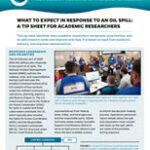
The Sea Grant Oil Spill Outreach Team released a tip sheet that discusses how academic researchers can become more familiar with priority oil spill research needs and with protocols for collecting data during response activities. Using feedback from academic, industry, and response representatives, the publication offers specific recommendations for actions that academic researchers can take Read More
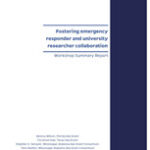
The Sea Grant Oil Spill Outreach Team a new report that draws from five workshops hosted by the Team where emergency responders and oil spill science researchers from around the Gulf of Mexico gathered to learn from one another. Workshop attendees discussed the role of academia in oil spill response, the response sector’s contributions to Read More

The Alabama Center for Ecological Resilience (ACER) Consortium fact sheet series highlights the project’s research groups and their scientific focuses. These materials can be used as a classroom resource for science teachers on in the northern Gulf Coast research and for those with a general interest in oil spill research. Introduction to ACER A brief Read More
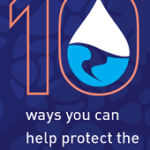
These small, educational brochures each highlight ten practical lifestyle practices that individuals can adopt to take better care of the world’s ocean. They can act as hand-outs for people visiting a table, educational booth, or public event. These files can be printed on card stock, cut, and folded into wallet-sized cards: Ten Ways You Can Read More
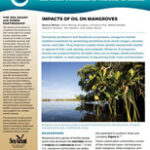
The Sea Grant Oil Spill Outreach Team released a publication that discusses various ways that oil exposure can impact mangroves, which have partially submerged root systems that make them especially sensitive to contaminants. Mangroves are widely distributed along Gulf of Mexico and Caribbean Sea coastlines, and they provide important ecosystem services such as protecting shorelines, Read More
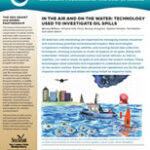
The Sea Grant Oil Spill Outreach Team released a publication on technologies that complement traditional ship, satellite, and mooring-based tools that researchers use to study oil spills, including Deepwater Horizon. These complimentary technologies include Unmanned Surface and Aerial Vehicles (USVs and UAVs), Saildrones, aerial drones, drifters, blimps, balloons, and advanced remote sensing technology. Read In Read More
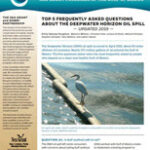
The Sea Grant Oil Spill Outreach Team released a publication that incorporates the latest science that answers the top five most frequently asked oil spill questions by people who depend on a clean and healthy Gulf of Mexico. Read Top Five Frequently Asked Questions about the Deepwater Horizon Oil Spill to learn about seafood safety, Read More
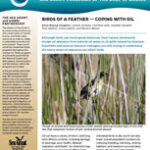
The Sea Grant Oil Spill Outreach Team released a publication that outlines what scientists have learned about how oil exposure affects birds. Using peer-reviewed research that covers oil spills around the world, the bulletin describes various effects ranging from birds directly exposed to oil to impacts on breeding and migration habits. Read Birds of a Read More
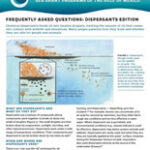
The Sea Grant Oil Spill Outreach Team released a product that concisely summarizes recent science regarding how dispersants work, how they are used, and how they affect sea life. The fact sheet also includes information on existing policies for chemical dispersants and how dispersants were used during Deepwater Horizon. Read Frequently Asked Questions: Dispersant Edition Read More
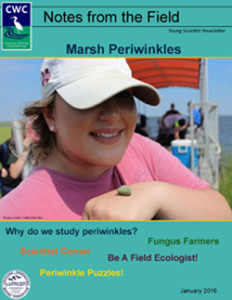
Notes from the Field is an educational newsletter created for middle school students that focuses on issues relevant to coastal communities in southeast Louisiana and the Gulf of Mexico. Exploring topics ranging from periwinkle snails to tropical storms to coastal erosion, each issue includes educational hands-on activities, puzzles, term glossaries, interviews with scientists, and scientific Read More
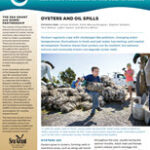
The Sea Grant Oil Spill Outreach Team released a publication about how oysters, which play a critical role in a healthy coastal wetland, fare when faced with oil exposure. The outreach publication also discusses how the Deepwater Horizon incident and subsequent response efforts affected oysters, a vital part of Louisiana’s seafood industry which is the Read More
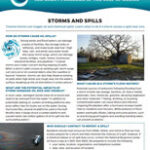
The Sea Grant Oil Spill Outreach Team released a Fact Sheet that uses easy-to-understand graphics and descriptions about how some oil accumulated at shorelines, on the ocean’s surface, in an underwater plume, and on the seafloor. Where did the oil go? A Deepwater Horizon fact sheet provides a public-friendly resource for all who are interested Read More

The Sea Grant Oil Spill Outreach Team released a publication that provides helpful information about storms and oil spills. Oil and chemicals from damaged rigs and vessels can form slicks that can pollute marine and shoreline ecosystems. If there is an existing oil slick offshore during a storm, high winds and rough seas can help Read More
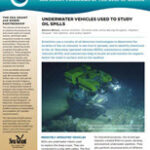
Have you ever wondered how scientists ‘see’ under water? The Gulf of Mexico Research Initiative is pleased to announce a new Sea Grant publication about the technology scientists use to look at and study the deep ocean, specifically manned and unmanned vehicles. Scientists have used remotely operated vehicles (ROVs), autonomous underwater vehicles (AUVs), and submarines, Read More
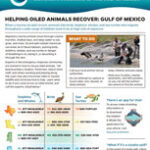
The Sea Grant Oil Spill Outreach Team released a publication that provides helpful tips for what to do if you come upon an oiled animal in the wild, including phone numbers for state-level animal-specific rescue authorities. Since even a small oil spill or leak can put certain migratory marine animals at risk for oil exposure, Read More
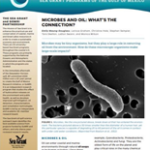
The Sea Grant Oil Spill Outreach Team released a publication that explains the role that microbes play in using oil as an energy source and removing it from the environment. The 8-page brochure Microbes and oil: What’s the connection? describes how these microscopic organisms can have a large-scale effect by quickly degrading oil in water Read More
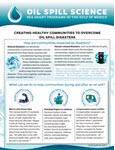
Ever wonder how individuals and communities can best recover from an oil spill? Check out our latest fact sheet. Find out what can we do to help communities during and after an oil spill. Human-caused disasters, such as accidental oil spills, tend to break down even the strongest communities. Impacts to human health, the environment, Read More
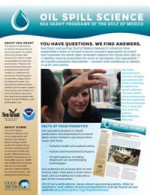
The Sea Grant Oil Spill Outreach Team is a team of oil spill science outreach specialists to collect and translate the latest peer-reviewed research for those who rely on a healthy marine ecosystem for work or recreation. Our specialists – all trained scientists themselves – connect with audiences in person, in print, and online. Our Read More
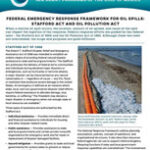
The Sea Grant Oil Spill Outreach Team released a product that gives a concise overview of the Stafford Act (1988) and the Oil Pollution Act (1990) that govern oil spill response. Also explained are how the National Response Framework, the National Contingency Plan, and the Oil Spill Liability Trust Fund fit into the picture. Read Read More
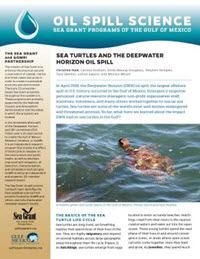
In April 2010, the Deepwater Horizon (DWH) oil spill, the largest offshore spill in U.S. history, occurred in the Gulf of Mexico. Emergency response personnel, natural resource managers, non-profit organization staff, scientists, volunteers, and many others worked together to rescue sea turtles. Sea turtles are some of the world’s most well-known endangered and threatened animals. Read More
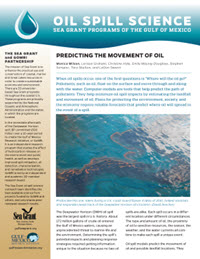
When oil spills occur, one of the first questions is “Where will the oil go?” Pollutants, such as oil, float on the surface and move through and along with the water. Computer models are tools that help predict the path of pollutants. They help minimize oil spill impacts by estimating the landfall and movement of Read More
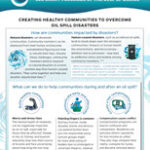
The Sea Grant Oil Spill Outreach Team released a publication that discusses how communities respond to a human-induced incident such as an oil spill as compared to natural disasters. Both types of events can affect the environment, economy, and human health; however, how people respond tends to be different. Social scientists documented a series of Read More
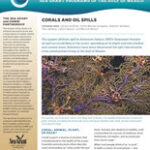
The Sea Grant Oil Spill Outreach Team released a publication that explains which corals were affected by the Deepwater Horizon incident and how scientists are monitoring those corals. The bulletin also describes the important roles that corals play in maintaining a healthy ocean and how corals worldwide struggle in the face of constant, multiple threats. Read More
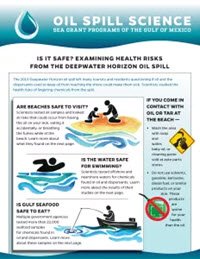
The 2010 Deepwater Horizon oil spill left many tourists and residents questioning if oil and the dispersants used to keep oil from reaching the shore could make them sick. Scientists studied the health risks of lingering chemicals from the spill. This fact sheet covers common questions, such as: Is Gulf seafood safe to eat? Are Read More
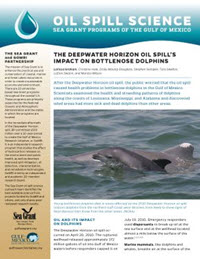
After the Deepwater Horizon oil spill, the public worried that the oil spill caused health problems in bottlenose dolphins in the Gulf of Mexico. Scientists examined the health and stranding patterns of dolphins along the coasts of Louisiana, Mississippi, and Alabama and discovered oiled areas had more sick and dead dolphins than other areas. OIL Read More
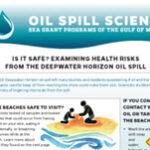
The Sea Grant Oil Spill Outreach Team released a publication that addresses the public’s questions about health safety after the Deepwater Horizon incident. The fact sheet, Is it Safe? Examining Health Risks from the Deepwater Horizon Oil Spill succinctly explains findings from peer-reviewed studies and reports from state and federal agencies that investigated the safety Read More
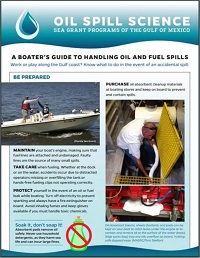
The Sea Grant Oil Spill Outreach Team released an informational brochure just in time for the summer boating season. The one-page guide gives boaters information on how to prepare for, respond to, and report an accidental oil or fuel spill on their vessels. A Boater’s Guide to Handling Oil and Fuel Spills, which is available Read More
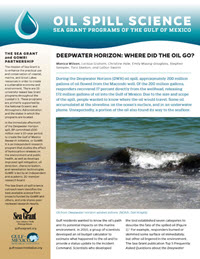
The Sea Grant Oil Spill Outreach Team released an informational publication that discusses the locations where approximate amounts of oil went after the Deepwater Horizon spill. The publication Deepwater Horizon: Where did the oil go? summarizes what researchers have discovered about where the spilled oil traveled and what processes carried it along its path. Included are response actions Read More

Scientists can use stable isotope analysis to determine stable isotope ratios in an organism’s tissues to reconstruct food webs in oiled and non-oiled coastal environments. Specifically, they collect blood and muscle tissue samples from mid-level and higher order consumers, like sharks, to find out if there was any effect of the oil on the consumer Read More
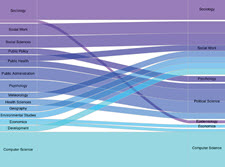
Experts at the Consortium for Resilient Gulf Communities (CRGC) come from from diverse fields. Working directly with experts outside their own fields of study enhances students’ insights about disaster, recovery, and resilience, while improving their problem solving skills and passion for their work. The two-page pamphlet describes the consortium’s efforts to provide graduate and undergraduate Read More
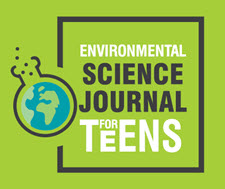
Recent research into Deepwater Horizon’s impacts on salt marsh fiddler crabs has been adapted for the journal’s Environmental Science Journal for Teens publication. The research team included researchers from two Louisiana State University-led projects (1, 2) and the Florida Institute of Oceanography. Read the article. Additional materials can be accessed here..

The Sea Grant Oil Spill Science Outreach Team released a new informational brochure just in time for the summer boating season. The one-page guide gives boaters information on how to prepare for, respond to, and report an accidental oil or fuel spill on their vessels. A Boater’s Guide to Handling Oil and Fuel Spills, which Read More

The Sea Grant Oil Spill Outreach Team released a new informational brochure that explores products currently available or in development to remove oil from water in future spills. The brochure Emerging Surfactants, Sorbents, and Additives for Use in Oil Spill Clean-Up addresses surfactants inspired by microbes, finding treasure in unexpected places (everyday materials), and tiny materials Read More

A Shoreline Cleanup and Assessment Technique (SCAT) map indicates the degree of oiling at a geographic location. SCAT teams survey shorelines to collect important data that will help them analyze the amount of necessary cleanup, choose cleanup techniques, and monitor clean up effectiveness. Read the full story here.

The Sea Grant Oil Spill Outreach Team recently developed a new informational brochure that explores basic aspects of oil as a natural resource and oil spills. The synthesizes peer-reviewed science for a broad range of general audiences, particularly those who live and work across the Gulf Coast. The brochure Frequently Asked Questions Oil Edition addresses Read More
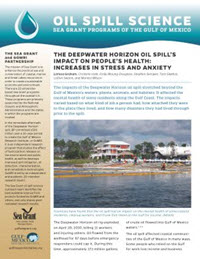
The Sea Grant Oil Spill Outreach Team released a new informational brochure about how the Deepwater Horizon oil spill affected the mental health of some Gulf Coast residents. They reviewed published science and worked with experts to develop this brochure for a broad range of audiences, particularly those who live and work across the Gulf Read More
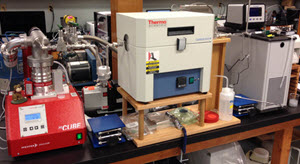
The post explains that a mass spectrometer, or mass spec for short, has become an important tool in many aspects of science including genetics, biochemistry, pharmaceuticals, environmental science, geology and ecology. The mass spec is an instrument that tells us the masses of specific chemical elements in a sample. Briefly, a mass spec works by Read More
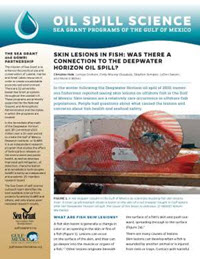
The Sea Grant Oil Spill Outreach Team released a new informational brochure about the connection of Deepwater Horizon and fish lesions reported in the winter following the spill. The team reviewed published science and worked with experts to develop this brochure for a broad range of audiences, particularly those who live and work across the Read More

This factsheet explains not only what gene sequencing is and how it works but also how scientists use it to identify and compare bacteria in sediment samples. Remember back in high school biology when you studied genetics and learned about DNA, nucleotides and gene sequencing? Join us for this week’s Tool Talk as we clear Read More
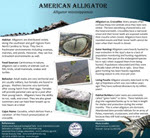
These fact sheets highlight various flora and fauna living in the south Louisiana marshes. Click the images below to download copies of these posters to share with your students. Visit the Coastal Water Consortium’s Education & Outreach website for more information. American Alligator Poster Needlerush Poster Roseate Spoonbill Poster Marsh Periwinkle Snail Poster Fiddler Crab Read More
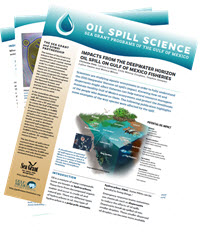
The Sea Grant oil spill science outreach team released an informational brochure about the Deepwater Horizon oil spill’s impacts on fisheries. This brochure synthesizes peer-reviewed oil spill science for a broad range of general audiences, particularly those who live and work across the Gulf Coast.The brochure Impacts From the Deepwater Horizon Oil Spill on Gulf Read More
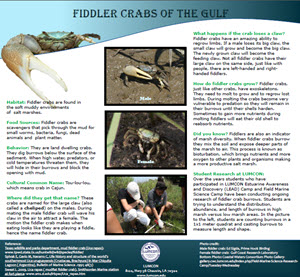
Want to know more about the fiddler crab? Click here to download the Coastal Waters Consortium (CWC) Fact Sheet on the Fiddler Crab’s habitat, food sources, behavior, cultural common name, and many more interesting facts. Over the years, students who have participated in Louisiana Universities Marine Consortium (LUMCON) Estuarine Awaremess and Discovery (LEAD) Camp and Field Marine Read More

The Sea Grant oil spill outreach team released three new informational brochures about the dispersants used to treat the Deepwater Horizon oil spill. These brochures synthesize peer-reviewed oil spill science for a broad range of general audiences, particularly those who live and work across the Gulf Coast. Chemical Dispersants and Their Role in Oil Spill Read More

The Sea Grant Oil Spill Outreach team released two new brochures that discuss Deepwater Horizon and beached oil. Top 5 Frequently Asked Questions about the Deepwater Horizon Oil Spill: Five years after the incident, tourists to the Gulf of Mexico still have questions about the oil spill. This publication addresses how the oil was cleaned Read More
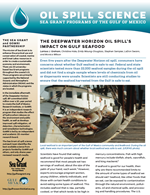
The Sea Grant Oil Spill Outreach team released two fisheries-related informational brochures that synthesize peer-reviewed oil spill science for a broad range of general audiences, particularly those whose livelihoods depend on a healthy Gulf. The Deepwater Horizon Oil Spill’s Impact on Gulf Seafood brochure presents results from federal, state, and independent seafood testing after the Read More

